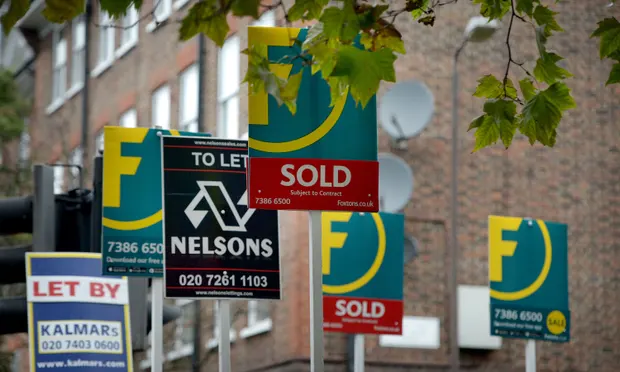UK house prices fell last month at the fastest annual rate in 14 years, as higher interest rates hamper people’s ability to buy a property with a mortgage.
Nationwide building society reported that prices fell 3.8% year on year, the sharpest drop since July 2009 when the global economy was in the grips of financial crisis. It compared with a fall in annual prices of 3.5% in June.
The price of a typical home is now £260,828, 4.5% below the peak reached last August. Prices dipped 0.2% in July from the previous month.
The average two-year fixed deal was 6.81% on Monday, while the average five-year fixed deal was 6.34%.
Robert Gardner, the Nationwide chief economist, said housing affordability “remains stretched” for those hoping to buy a home with a mortgage.
For example, someone on the average wage who wants to buy a typical first-time buyer property with a 20% deposit would have to make monthly mortgage payments of 43% of their take-home pay, assuming a 6% interest rate. This is up from 32% a year ago and well above the long-term average of 29%.
“This challenging affordability picture helps to explain why housing market activity has been subdued in recent months,” Gardner said. There were 86,000 completed housing transactions in June, 15% below the levels at the same time last year and about 10% below pre-pandemic levels.
Mortgage approval data showed an increase in activity in June, but most of these applications will predate the more recent rise in longer term interest rates, he said. Bank of England data on Monday showed mortgage approvals in the UK rose to their highest level since October as people scrambled to secure home loan deals before interest rates rise further.
Nationwide believes a housing crash is unlikely, assuming unemployment – currently 4% in the UK – remains below 5%, and most borrowers should be able to cope with higher interest rates.
Gardner concluded: “While activity is likely to remain subdued in the near term, healthy rates of nominal income growth, together with modestly lower house prices, should help to improve housing affordability over time, especially if mortgage rates moderate once Bank rate peaks.”
Economists are predicting further declines in house prices.
Gabriella Dickens, the senior UK economist at Pantheon Macroeconomics, said: “Consumers’ confidence remains well below its long-run average, and expectations that house prices will fall further are well-entrenched. Accordingly, we think that house prices will have to fall by about 8% from their peak before demand and supply come back into balance.”
Imogen Pattison, an assistant economist at Capital Economics, forecast a further 7% drop in house prices on top of the near-4% decline to date. “While we suspect mortgage rates have now peaked, we expect them to stay at 5.5%-6% until mid-2024 when we think the Bank of England may start cutting Bank rate,” she said.


